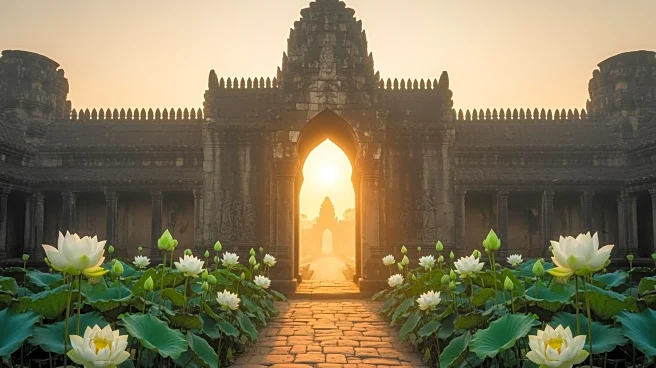What's Happening?
Pakistan has welcomed over 2,100 Sikh pilgrims from India to commemorate the 556th birth anniversary of Guru Nanak, marking a significant gesture of diplomacy amid ongoing tensions between the two nations. The pilgrims crossed the Wagah-Attari border,
which had been closed following the May 2025 border clashes, the deadliest since the 1999 Kargil conflict. This event underscores Pakistan's commitment to interfaith harmony and cultural diplomacy, as the pilgrims visit sacred sites such as Nankana Sahib and Kartarpur Sahib in Pakistan. The move is seen as an act of moral leadership, promoting coexistence and respect for all faiths, despite the strained political relations.
Why It's Important?
The reception of Sikh pilgrims by Pakistan is a significant diplomatic gesture that could potentially ease tensions between India and Pakistan. It highlights Pakistan's role as a custodian of Sikh heritage, fostering people-to-people connections even when official diplomacy is stalled. This initiative not only promotes religious tourism but also serves as a confidence-building measure, offering a 'corridor of peace' through the Kartarpur Corridor. The event reflects Pakistan's broader narrative of interfaith harmony, rooted in the vision of its founder, Quaid-e-Azam Muhammad Ali Jinnah. It contrasts with India's cautious approach, which limits the scale and visibility of such exchanges.
What's Next?
The reopening of the Wagah border for Sikh pilgrims could pave the way for further religious and cultural exchanges between India and Pakistan. It may encourage both nations to explore alternative pathways to peace through acts of faith and goodwill. However, the asymmetry in their approaches to cross-border engagement remains a challenge. Pakistan's continued efforts to promote religious tourism and preserve Sikh heritage could strengthen its diplomatic position and foster economic growth through cultural exchange. The initiative may also inspire other regions to consider similar gestures of goodwill to bridge divides.
Beyond the Headlines
The return of Sikh pilgrims to Pakistan is not just a religious journey but a symbol of hope in a region often defined by animosity. It highlights the deep roots of Sikhism across the subcontinent, intertwined with the shared soil and cultures of Punjab, divided by the Partition of 1947. The event serves as a reminder that history's wounds can be healed through humanity, not hostility. Pakistan's gesture is a quiet but powerful assertion that religious harmony and cultural respect are enduring strengths, offering a model for peace in a region marked by political walls.
















